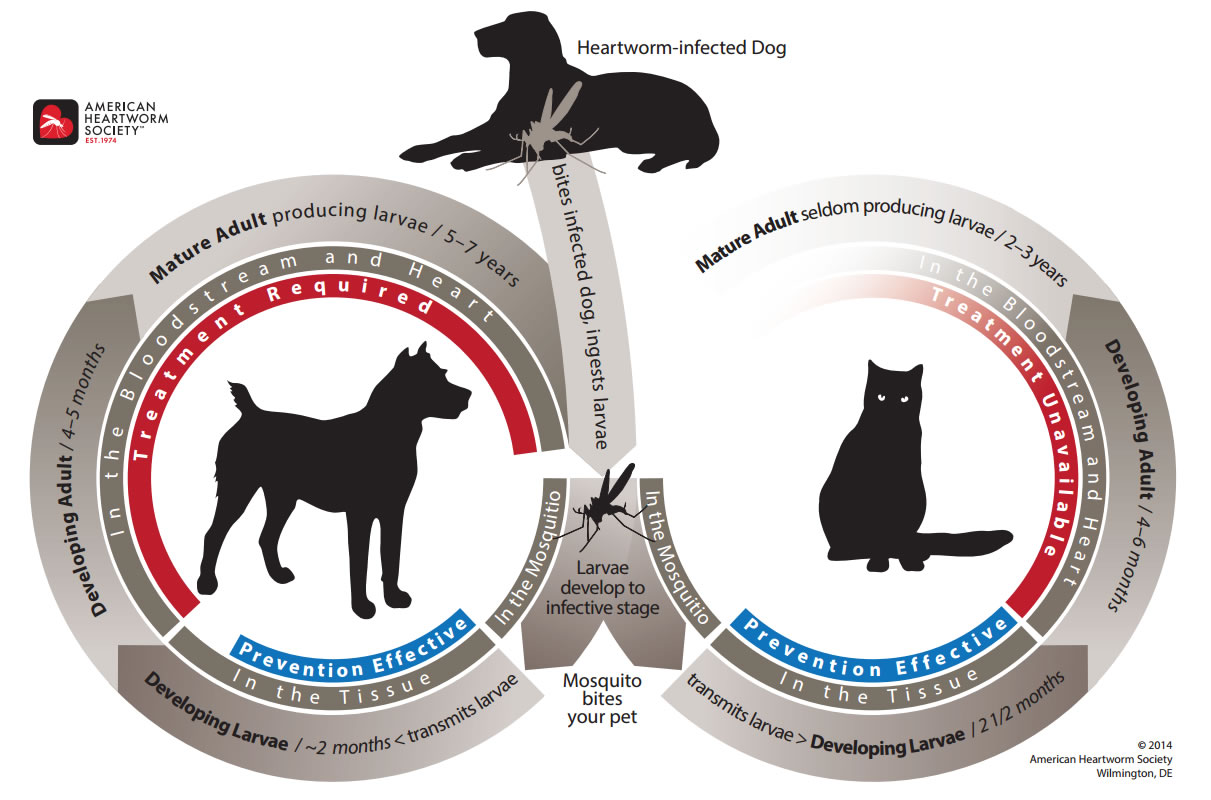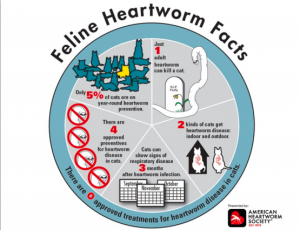April is National Heartworm Awareness Month, and Goodnewsforpets wanted to inform pet parents of basic information to keep both you and your pets safe all year.
More resources can be found here, including the Why Wait for the Bite campaign sponsored by Ceva Animal Health, makers of Vectra 3D® which covers the hidden dangers of the bugs that bite our pets and what you can do to prevent it.
Heartworm Disease
Heartworm disease is a serious disease that results in severe lung disease, heart failure, other organ damage, and death in pets. It is caused by foot-long worms that live in the heart, lungs and associated blood vessels of affects pets. The disease mainly affects dogs, cats, and ferrets, but other wild species can be carriers because of their proximity to populated areas.
A dog infected with heartworm disease has been known to harbor several hundred worms in their bodies. Heartworms can mature into adults, mate and produce offspring within the host dog, with the average life span of the heartworm being 5 to 7 years. Adult female heartworms release their offspring into the dog’s bloodstream, when a mosquito bites an infected dog the mosquito becomes infected and can in turn infect the next mammal it bites. Even with treatment, the disease can cause long-lasting damage to the heart and associated organs. Prevention is the best option, but if a dog should become infected early treatment is key to managing damage and quality of life.
Heartworm disease in cats is different from heart disease in dogs as most worms do not survive to adults. This makes heartworm disease in cats much harder to detect, and often goes undiagnosed. It’s important to note just because cats do not harbor adult worms does not mean the disease won’t cause significant damage to the cat’s health. A condition known as heartworm associated respiratory disease, also known as HARD. Treatment is a less viable option in cats, so prevention is the only means of protection for cats.
Heartworm Disease Transmission
 Heartworm disease is not contagious, a dog cannot catch the disease from being near an infected dog, it is only spread through the bite of a mosquito. The mosquito plays a pivotal role in the spread and lifecycle of the heartworm. Adult female heartworms produce baby worms that circulate within the host’s bloodstream. When a mosquito takes a blood meal from an infected animal it takes the baby worms along with the blood, the worms develop in the mosquito for 10-14 days and then get deposited through the mosquito’s bite into a new host.
Heartworm disease is not contagious, a dog cannot catch the disease from being near an infected dog, it is only spread through the bite of a mosquito. The mosquito plays a pivotal role in the spread and lifecycle of the heartworm. Adult female heartworms produce baby worms that circulate within the host’s bloodstream. When a mosquito takes a blood meal from an infected animal it takes the baby worms along with the blood, the worms develop in the mosquito for 10-14 days and then get deposited through the mosquito’s bite into a new host.
Signs of heartworm disease in dogs:
- mild persistant cough
- reluctance to exercise
- fatigue after moderate activity
- decreased appetite
- weight loss
 Long term infection may lead to heart failure and excess fluid that may accumulate in the belly. And sometimes can block blood flow in the heart leading to cardiovascular collapse, which can only be treated with surgery.
Long term infection may lead to heart failure and excess fluid that may accumulate in the belly. And sometimes can block blood flow in the heart leading to cardiovascular collapse, which can only be treated with surgery.
Signs of heartworm disease in cats:
- coughing
- asthma-like attacks
- vomiting
- decreased appetite
- weight loss
Owners sometimes might observe a labored gait, fainting or seizures. Unlike dogs, cats may not show any symptoms and may collapse suddenly, resulting in death.
Testing for Heartworm Disease
As with the disease, testing is different for both cats and dogs.
Dogs should be tested annually, that is why annual wellness examinations with your veterinarian are so important. Even dogs that have been given year round preventative care should be tested during their annual exam, preventatives are highly effective, but not 100% effective. All dogs under 7 months of age can be started on preventative care prior to be tested, dogs over the age of 7 months need to be tested before starting preventative medication.
Cats with heartworm infection are harder to detect than in dogs because heartworms rarely develop adult worms. The heartworm screening procedure for cats includes both an antigen and antibody test, ultrasound or x-ray may also be used. There is no approved treatment for a heartworm infection in cats, that is why testing and prevention are critical.
As with any condition prevention and early detection are key in maintaining your pet’s health. Regular veterinarian visits and preventative care are strongly urged, but knowledge is also powerful. Pet parents must keep themselves informed about possible risks to their pet’s health and form a plan with their veterinarian to maintain their pet’s health.
For more information speak with your veterinarian and visit the American Heartworm Society for additional resources.
Sources:
https://www.heartwormsociety.org/pet-owner-resources/heartworm-basics
http://www.fda.gov/AnimalVeterinary/ResourcesforYou/AnimalHealthLiteracy/ucm188470.htm

